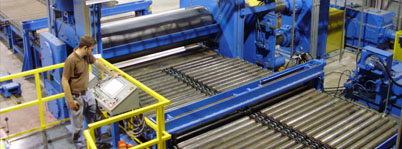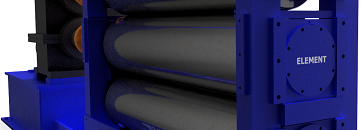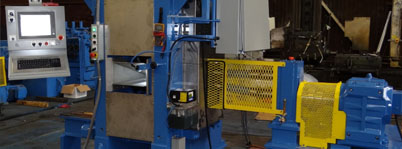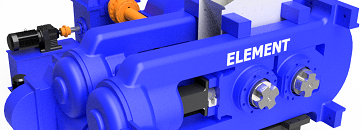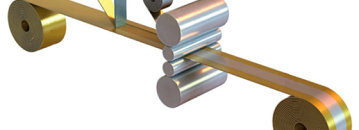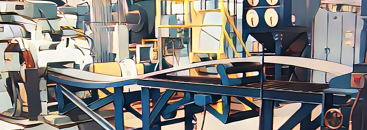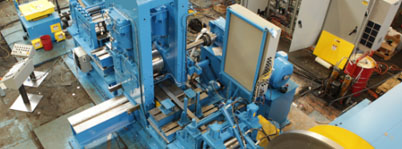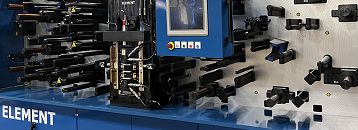A rolling mill is a specialized piece of equipment used for reducing the thickness of various materials within precise tolerances through a set of rollers. Rolling mills have many different designs and may be stand-alone pieces of equipment used for processing plate or ingot, or incorporated into full processing lines used for coil-to-coil processing.
To ensure outgoing material gauge meets a required dimensional tolerance, a rolling mill typically has very accurate positioning feedback. Typical industry standards that can be used to identify these tolerances include ASTM, ANSI (American National Standards Institute), AISI(American Iron and Steel Institute), EN (European Standards) , JIS (Japanese Industrial Standards Committee), or API (American Petroleum Institute).
ROLLING MILL EXPERIENCE
Rolling mills can be supplied with multiple different configurations which are selected based on material type, thickness, and yield strength. Element has built a wide variety of rolling mills to fit multiple applications.
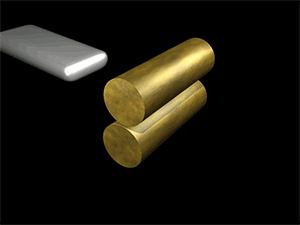
MINIMUM |
MAXIMUM |
|
|---|---|---|
| Material Thickness | 0.00025″ (0.0063 mm) | 12″ (305 mm) |
| Material Width | 1″ (25.4 mm) | 144″ (3,658 mm) |
| Coil Weight | 500 lbs (228 kg) | 100,000 lbs (45,359 kg) |
| Separating Force | 50 UST (45 MT) | 3,000 UST (2,722 MT) |
| Line Speed | 50 FPM (15 MPM) | 3,000 FPM (914 MPM) |
| Thickness Tolerance | +/- 0.0001″ (0.0025 mm) | +/- 0.002″ (0.051 mm) |
Element Rolling Mills meet a wide variety of multiple applications used in different industries and are built with the following options:
CONTROL OPTIONS |
WORK PIECE TYPES |
INDUSTRIES SERVED |
|---|---|---|
|
|
|
TOLERANCES |
MATERIALS |
|---|---|
| Typically rolling mills have very accurate positioning to ensure outgoing material gauge meets a required dimensional tolerance. Typical industry standards that can be used to establish these tolerance include: | Rolling mill systems can be used to reduce a variety of materials. Element Machinery has built mills to reduce a wide variety of incoming material including cladded materials. Some typical materials include:
|
WHAT WE OFFER
2 High Rolling Mill
Rolling mills consisting of two rolls are known as a 2 High Rolling Mills and are used for anything from temper pass to breakdown of the material.
3 High Rolling Mill
A 3 High Rolling Mill consists of three rolls and is typically used for either performing multiple reduction passes by wrapping material around the center mill roll, or for bonding of dissimilar stacked material passed through the mill. Three High Rolling Mills can also be used for flattening of expanded metal sheets.
4 High Rolling Mill
A four roll configuration is known as a 4 High Rolling Mill, whereby the work rolls are generally smaller in diameter supported by larger backup rollers. These mill can be used for tighter tolerance output material, and for reducing material to extremely small thicknesses.
Compacting Rolling Mill
Compacting rolling mills are used for converting powder or powder like material into continuous strip.
Cladding Rolling Mill
Cladding rolling mills are used to combine two dissimilar materials into a single strip through compression.
Casting Rolling Mill
Casting rolling mills are used for continuous roll casting of strip. Casting rolling mills are typically 2 or 4 high hot mills capable of providing consistent thickness strip from hot cast incoming material.
Embossing Rolling Mill
Specialized rolling mills that emboss a pattern or indent into metal strip are known as embossing mills. These patterns can be used for decoration, to help with structural qualities of tubing or simply to increase material length without significantly decreasing the material thickness for cost savings.
Lithium Metal Processing
We supply a broad range of machinery and services to help in your lithium metal processing application.
HOW CAN WE HELP YOU?
Give us a call (855) 447-7648 or send us a message here.


